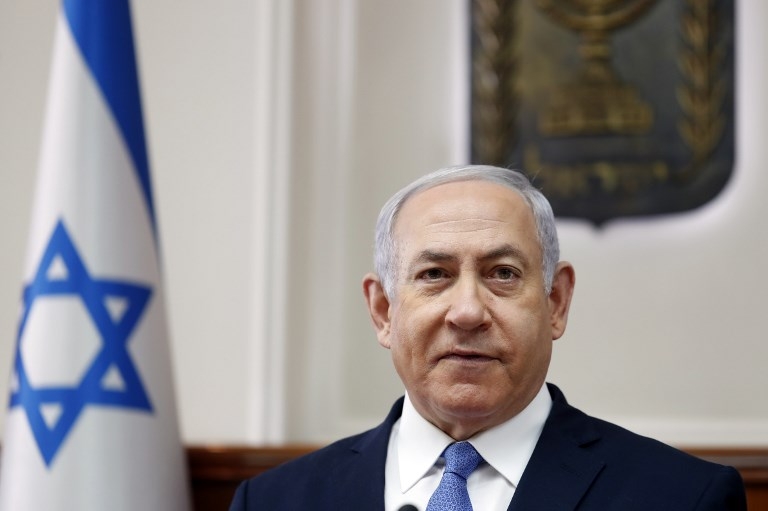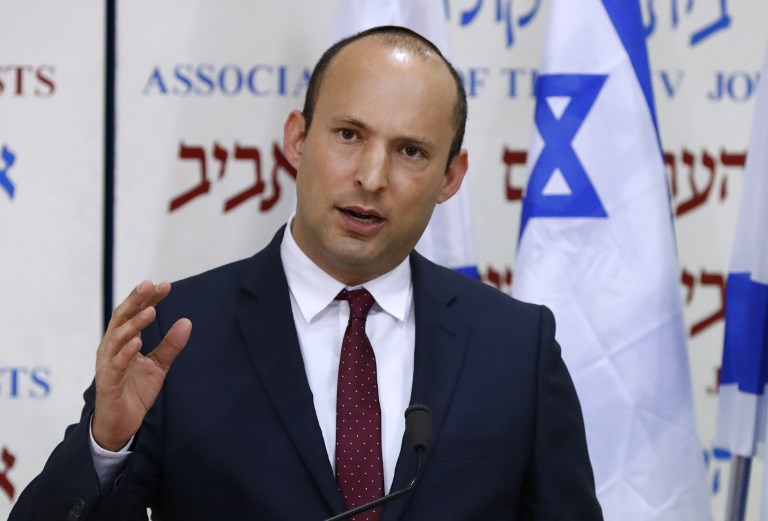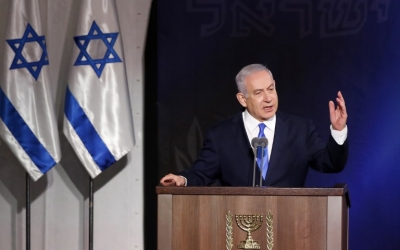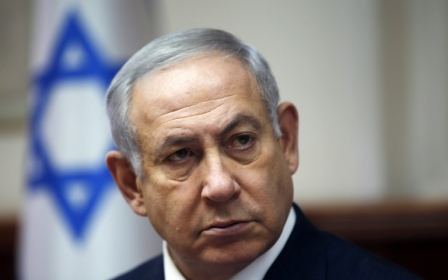Israel elections: The vultures are circling Netanyahu

Israel will go to the polls in national elections on 9 April, and in the run-up, maneuvering by political parties and their leaders has intensified.
The primary question is: will Attorney-General Avichai Mandelblit indict Prime Minister Benjamin Netanyahu on any of the corruption counts he’s accused of before the election? Netanyahu desperately seeks to avoid this outcome, as it would put enormous pressure on him to resign.
Israel’s top court just ruled that Mandelblit does not have to delay an indictment until after the election. It appears, based on reports in Israeli media and statements from Mandelblit himself, that he will probably indict Netanyahu on at least one count before the election.
If he does, members of the current governing coalition will have to determine whether they’re willing to serve in a future government with an indicted prime minister.
Threat of prison time
New MEE newsletter: Jerusalem Dispatch
Sign up to get the latest insights and analysis on Israel-Palestine, alongside Turkey Unpacked and other MEE newsletters
The last time this happened, former prime minister Ehud Olmert’s partners refused to permit him to continue after he was accused of charges involving real estate bribes. He resigned and eventually served prison time.
Though it’s not yet clear whether Netanyahu would be convicted, no Israeli attorney-general would proceed with such a momentous case without strong evidence. Thus, the chances that Netanyahu, and possibly his wife Sara, will be convicted of criminal charges and sentenced to prison are quite strong. He could be the second prime minister in a row to end up behind bars.
In the past, Netanyahu’s sycophantic followers would have rallied to his cause and echoed these scurrilous charges. But curiously, no one has done so
Though Netanyahu continues to command loyalty from his followers in Likud, his ironclad hold on the party is loosening by the day. Rivals threaten him both from within the party and outside. Within, he faces a real threat from Gideon Saar, a former minister who is among many young princes Netanyahu has driven from the political stage.
Likud recently held its primaries and the results didn’t augur well for Netanyahu. Though he polled in the top spot, as was expected, four of the top five candidates are considered rivals with whom he has a tense relationship. Saar polled fifth, putting him in a very competitive position should Netanyahu exit. Netanyahu has felt threatened by Saar’s popularity for years, and has falsely accused the former interior minister of organising an internal “putsch” against him.
In the past, Netanyahu’s sycophantic followers would have rallied to his cause and echoed these scurrilous charges. But curiously, no one has done so. This likely means that the Likud leadership (aside from Bibi) is biding its time, waiting to see who will come out on top. If the current prime minister falls, they want to be in line to reap the benefits, in the form of cabinet appointments and other perks.
Strong rivals
From without, Netanyahu faces two strong rivals. Naftali Bennett, the education minister and former leader of the pro-settler Jewish Home, has abandoned that party for his new banner, the New Right. His professed goal is to unify his former extreme right-wing religious supporters with secular right-wing nationalists in a new movement that would eventually propel him to power.
Apparently, his abandonment of his former colleagues hasn’t gone over terribly well, and polls haven’t shown him picking up much new support.
In 2013, Jewish Home under his leadership won 12 seats; in the 2015 election, it sunk to eight. A recent poll indicated he could win just seven, which may be why there has been talk of a merger with Likud.
Netanyahu’s second external rival promises to be a more formidable challenger. Former army chief of staff Benny Gantz has created the Israel Resilience party, which offers little different than existing centre-right parties, except his face atop the candidate list. Given Israel’s obsession with security and the cherished role played by the military in society, any chief of staff throwing his hat in the political ring automatically becomes a potential prime minister.
But Gantz’s views are almost opaque. In a video launching his candidacy, he used stolen Palestinian drone footage surveying the Dresden-like destruction wreaked on Gaza during the 2014 assault, which he commanded. He boasted of killing hundreds of Palestinians, as though this were a successful wedge issue in Israeli elections (alas, it is).
Apart from this, Gantz holds views common to other centre-right leaders.
Whither the centre-left?
If you’re wondering where the centre-left is amid all this political jockeying, you’ll be disappointed to know that the Labor Party has done a terrific job of destroying itself. Party chief Avi Gabbay decimated party ranks by publicly divorcing his Zionist Union co-leader, Tzipi Livni, before TV cameras. This bit of political knifesmanship was not appreciated by the electorate, with polls showing Labor will drop from its current 19 seats to six.
Despite media portrayals of Labor as a “left” or “centre-left” alternative to Likud, in truth, it is neither. The party is pro-war, anti-Palestinian and pro-capitalist. It stands for policies that are no different than centre-right parties, such as Yesh Atid. It exists solely out of a sense of nostalgia for what it once was, when it stood for democratic socialist values.
The traditional Zionist left party, Meretz, has polled at four seats, down from its current five. It is in danger of failing to cross the electoral threshold, which would mean there would be no Jewish left party in the Knesset for the first time in decades.
Its role has been as watchdog and critic of the worst extremes of the dominant far-right political forces. At times, it can muster enough support to torpedo the most egregious, racist legislative proposals. But in the current climate, it succeeds less and less.
The Jewish nation-state law, which demoted Arabic as a national language and enshrined Jewish religious supremacy, could not be stopped by any amount of criticism from the loyal Zionist-left opposition.
Finally, the Joint List, an alliance of Palestinian-dominated parties, is threatened by MK Ahmed Tibi, whose party withdrew from the arrangement to run independently. The Joint List represents the only truly non-sectarian left-wing political grouping in the Israeli parliament. Despite being the third-largest faction, its power is limited by a number of factors.
Things can get worse
Firstly, parties that might form a governing coalition would refuse to include an “Arab” party. Secondly, most of the Palestinian MKs are harassed routinely by Israeli police investigations and trumped-up internal Knesset charges, often leading to penalties.
Thirdly, Israeli Jews view their fellow Palestinian citizens with deep mistrust - despite the fact that internal polls repeatedly show that Palestinians retain a strong allegiance to the state - permitting the marginalisation of Palestinian political power.
As long as Israel continues to privilege its Jewish majority, such voter participation [among Palestinians] is unlikely
Considering the systemic prejudice that Palestinian citizens of Israel face, they vote at a surprisingly high rate (53 percent in the last election) - but the rate is still much higher among Israeli Jews.
If more Palestinians voted, they could potentially double their Knesset representation, propelling the Joint List to leading-party status in a governing coalition. Yet, as long as Israel continues to privilege its Jewish majority, such voter participation is unlikely.
The vote on 9 April will likely bring results little different than the current government. The faces may be different, the leader may be different, but the essential rejectionist views of all Israeli governments going back several decades will remain the same.
And with US President Donald Trump facilitating Israel’s worst impulses, things cannot get better - though they surely can get worse.
The views expressed in this article belong to the author and do not necessarily reflect the editorial policy of Middle East Eye.
This article is available in French on Middle East Eye French edition.
Middle East Eye delivers independent and unrivalled coverage and analysis of the Middle East, North Africa and beyond. To learn more about republishing this content and the associated fees, please fill out this form. More about MEE can be found here.







